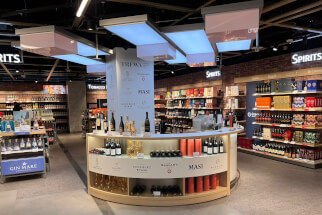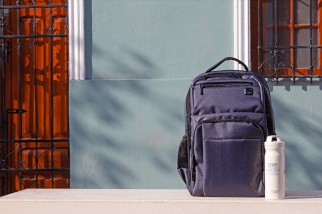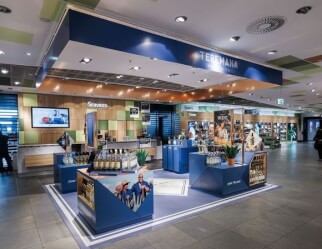ARI’s Jackie McDonagh makes things work in tough times
ARI’s Jackie McDonagh on the changing world of travel retail
While the Canadian travel reality has gone from bad to worse since COVID-19 began affecting travel early in 2020, Jackie McDonagh, ARI General Manager North America, says her division has been able to manage the crisis without any company refinancing. “I’m very proud of the way we’ve managed cash flow,” she says. “We have cut costs, reworked our budgets and have put in place many protective measures to keep up our cash flow.”
McDonagh says the company has continued to order best-selling stock, but has scaled down on orders. “We’ve worked closely with our brand partners in terms of managing those stocks, in creating promotional offers to drive revenue and to offer our customers even better value when they come to the airport.”
No duty paid
Travel retail the world over has faced incredible challenges since early 2020, but ARI Canada has faced more than most. Before the pandemic even began, travel retail in Canada was missing two opportunities most others have — duty paid and duty free on arrival. Duty paid stores could have done much to help the industry during this time as international travel has all but ground to a halt. “You can’t gift in an airport here while flying domestic,” says McDonagh. “We’re the second largest country in the world. These are long haul flights. You go to visit your friend or family and you can’t pick them up a gift in the airport. There’s a huge appetite for a domestic duty paid program, and the 38 million people who live in Canada are at a disadvantage.”
Arrivals are the other side of that coin, which McDonagh says makes up 50% of sales globally but which Canadian retailers do not have. “We’ve been in a lobbying process for many years now, working together with other retailers,” she says. “We will continue to strive for this; it is not just about the retail opportunity — this would be a game changer. The passenger would benefit, government would benefit from taxes, the airport would benefit, and ultimately it would create new jobs.”
Testers remain, with assistance
The perfume and cosmetics category is always a top seller in travel retail, but testing is important for the customer and the pandemic has created a difficult situation in this regard. Most retailers have taken testers off the floor completely, but McDonagh decided on a different approach. “Most stores took testers off floor; In Montreal, we didn’t go that route. We replaced old testers and put appropriate signage and screens up for customers to ask for help. So people still can test, but it is closely guarded by our team and there are appropriate sanitation measures in place to ensure no spread of infection.
For makeup, she’s asked the team to show the colour on a blotter, socially distanced form the customer. “It’s very hard to see the colour of a lipstick from the sticker on the bottom,” she says. “So a team member will show it on a fragrance blotter. If someone wants to see foundation, you show it on the blotter.”
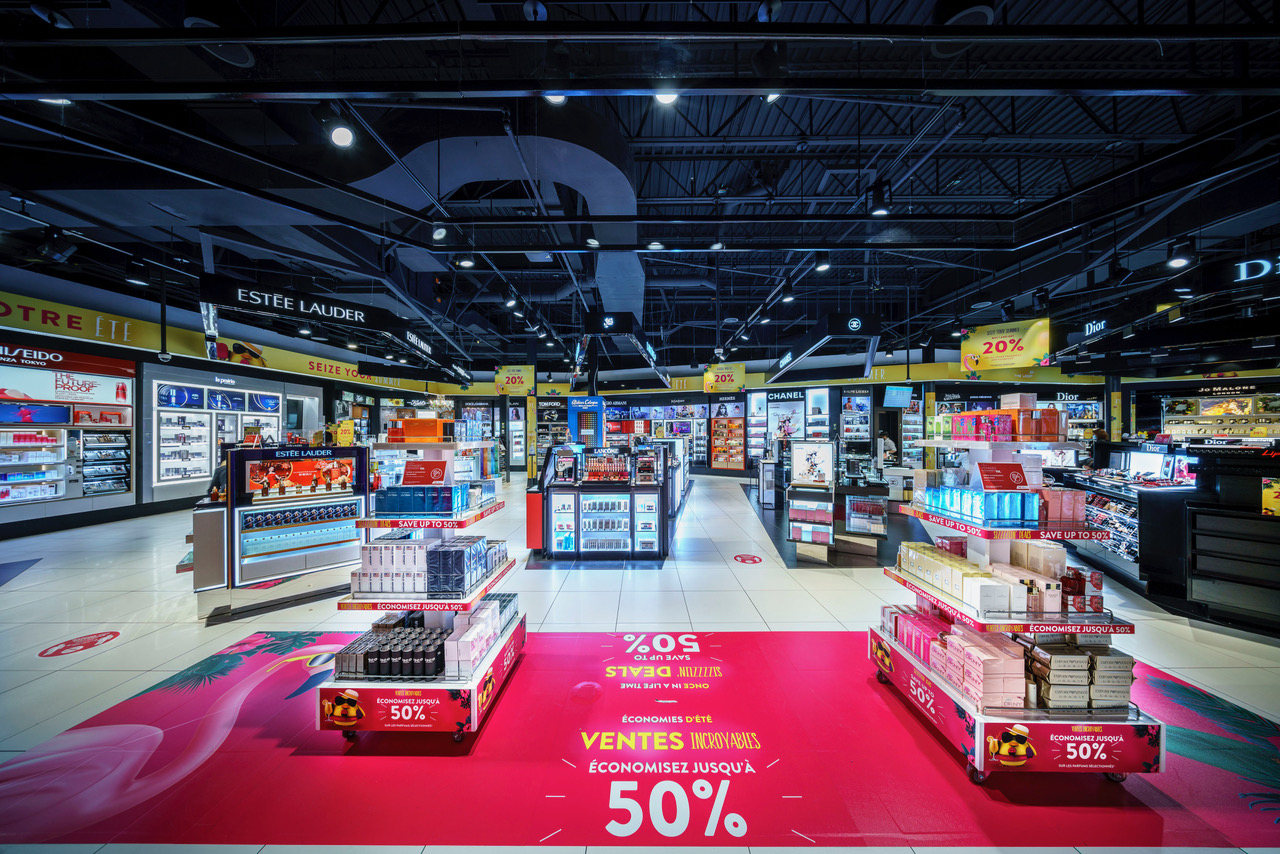
McDonagh and her team have worked closely with brand partners to create promotional offers that drive revenue and offer even better value to customers
Award-winning click and collect
Last July, ARI launched its Click and Collect desk and its connected award-winning online shopping experience, with 5,000 products available to purchase and about 1,500 more to be added. “Up to 90 days before you fly you can place your order. We preauthorize your credit card because for duty free you have to purchase the day of your flight. You go to the desk, finish your transaction, you get your receipt and go to the gate.”
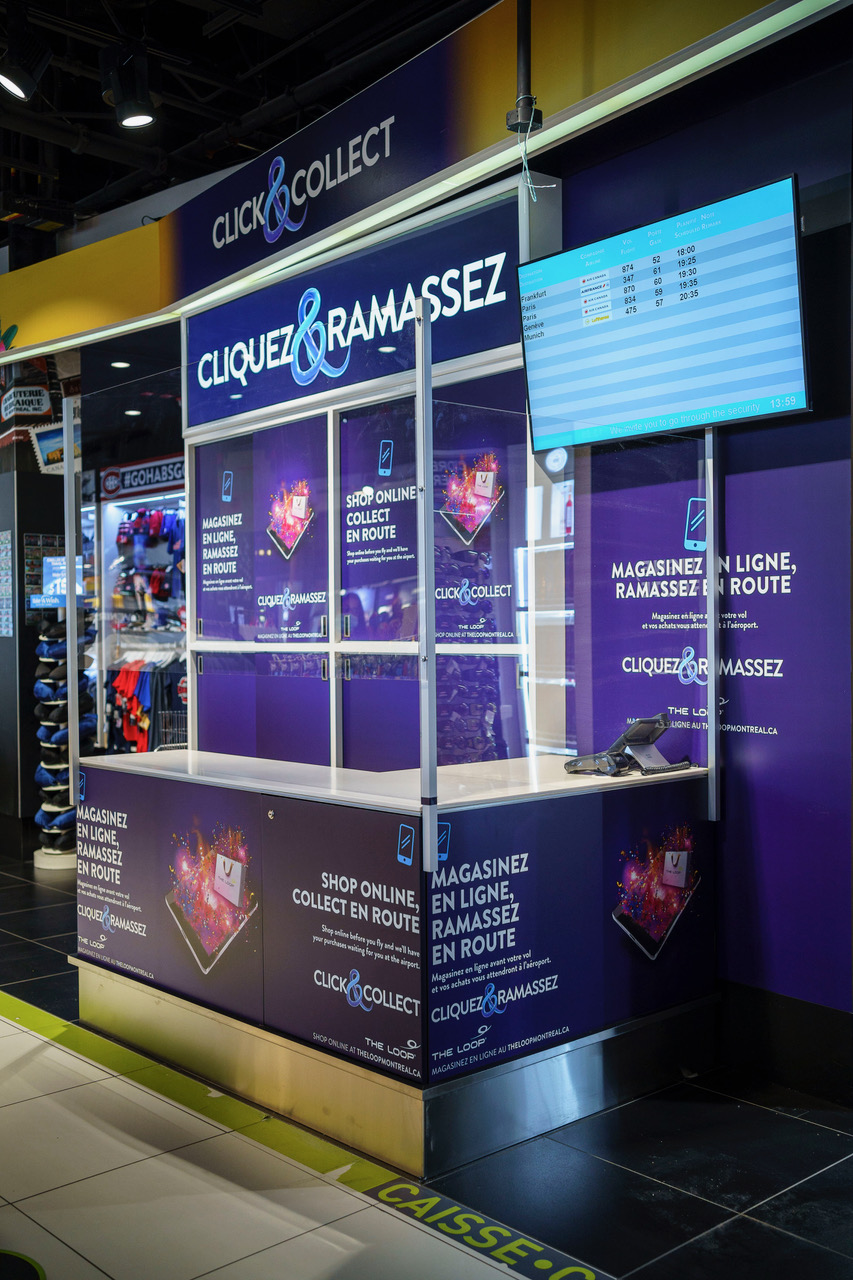
ARI’s award-winning Click and Collect system allows travelers to choose from 5,000 items and then pick them up on the day of travel
Pickup in December, then drop
Business for ARI Montreal in 2020 was 73% lower than in 2019, even with a strong beginning in January. “Like Vancouver, we probably got hit more than other locations because of Chinese flights. Chinese flights started dwindling the end of January and into February, and then stopped altogether. We were hurt before a lot of our peers,” McDonagh says. The stores closed on March 24 and the international store didn’t reopen until July 14. When she began seeing flights to Fort Lauderdale, she opened up the transborder shop.
“We had a really good December, with 35% of 2019 sales. That was the strongest month we had. Lots of people were going home for Christmas or going home in general, carrying three or four suitcases with no intent to come back for a few months. These people hadn’t seen their family so they were gifting a lot. January was ok but then the travel restrictions with the three-day hotel quarantine announced people panicked and since then, the situation has gone from bad to worse.”
Whereas before the flights to and from the Caribbean were halted and the hotel quarantine had begun sales were about 18 to 19% of 2019 numbers, this immediately dropped to 7%. McDonagh explains the reasoning in staying open at such a time. “I didn’t want to shut stores again because I don’t want to lay off team members. A certain number of transborder flights go out in the morning, mainly to New York or Chicago, and Florida. We open in the morning just for those flights. We shut the transborder store at 2:00 pm because there’s no activity after that. Then at that time we open the international store, because the first flight goes out 4:00 pm. We keep that open until 10:00 pm to service all the international flights.”
In the early part of the week that’s only about a dozen flights each evening, to Paris, Frankfurt, Doha and Tel Aviv. By the end of the week this jumps to about 25 international flights per night. The London variant caused London flights to all be canceled, coming and going.
Main business disappeared
While international flights to Europe were drastically cut, the biggest issue for the retailer has been the cancelation of flights to the Caribbean and Cancun. “Montrealers stay in Canada in the summer but in the winter they go south. We just had spring break. That’s usually our busiest time of the entire year and there’s nobody travelling to the Caribbean. There are no flights going down and no flights coming back.
“We did budgets in September and October making an assumption that smaller airports would be open by March/April, which hasn’t happened. We thought we’d have a charter season with people would be going south and that never happened. We thought transborder store would be open in March/April; that also didn’t manifest.”
Subsidies and partnerships
“Amazing” partnerships with landlords and stakeholders have helped the retailer. “We’ve worked very successfully together to come up with a recovery plan,” says McDonagh.
The wage subsidy program has helped, but that is the only help that has come from the government. Employers are able to receive 75% of an employee’s salary, up to $870/wk. This program continues until the end of March. The prime minister has stated the program will be extended until end of June but as of this writing the details had not been announced. “That has enabled me to keep on the team we have at the moment,” says McDonagh. “Unfortunately we had to temporarily lay off members of the team, which is never an easy decision for us, personally or professionally; they are being supported by the government. We’ve had to extend that temporary layoff period.”
Slow recovery, strong 2022
The plan for 2021 is a slow recovery, says McDonagh. “It’s very difficult to predict. I used to be very good at predictions until last year. What you think is going to happen might not. Here we were thinking we were going to be better off by now and we’re actually worse off.”
That being said, she does predict that some southern flights will resume at the end of April. While the US is rolling out vaccine pretty quickly and will likely open its borders earlier, the Canadian vaccine rollout is slower. Most Canadians will have had the vaccine by September, and McDonagh believes by that time travel will be opening up again. “Passenger flights will be slow for summer. So it will be a slow year, ramping up end of Q3 into Q4. I’d like to believe Caribbean travel will be back on by Q4. I personally don’t see Chinese flights coming back until 2022.”
McDonagh believes a vaccination passport is likely, that travelers from countries with low vaccination rates will still have to quarantine, and that there will probably be quarantine bubbles, meaning open travel for countries with high vaccination rates.
“We could get a huge 2022 because people are just itching to travel. People are going to be traveling for two reasons: first, to see family and friends and second, for leisure. These passengers are the spenders,” she says. “People are excited to travel. As travel retailers we need to get them excited to come to the airport. Great promotions, great products, great gifting products.”
McDonagh says this time offers a huge opportunity for the travel retailer. She says retailers need to take this opportunity to look inward. “What are our ranges? What’s our offer? Is it strong enough? What about customer service, convenience? What will be the new expectations in a post-COVID world? These are just some of the things we are currently strategizing at ARI.”
She says things were ticking along, growing year on year, then Chinese travelers came along to boost sales even more, and now is a time for reflection. “There is lots of planning to be done. All of these things need to be looked at because service is now more important than ever, from an efficiency perspective and a human perspective. Are there new categories we should be introducing? Are there brands within those categories? Retailers really need to look internally within, and work with airports and say how can we do this together.”
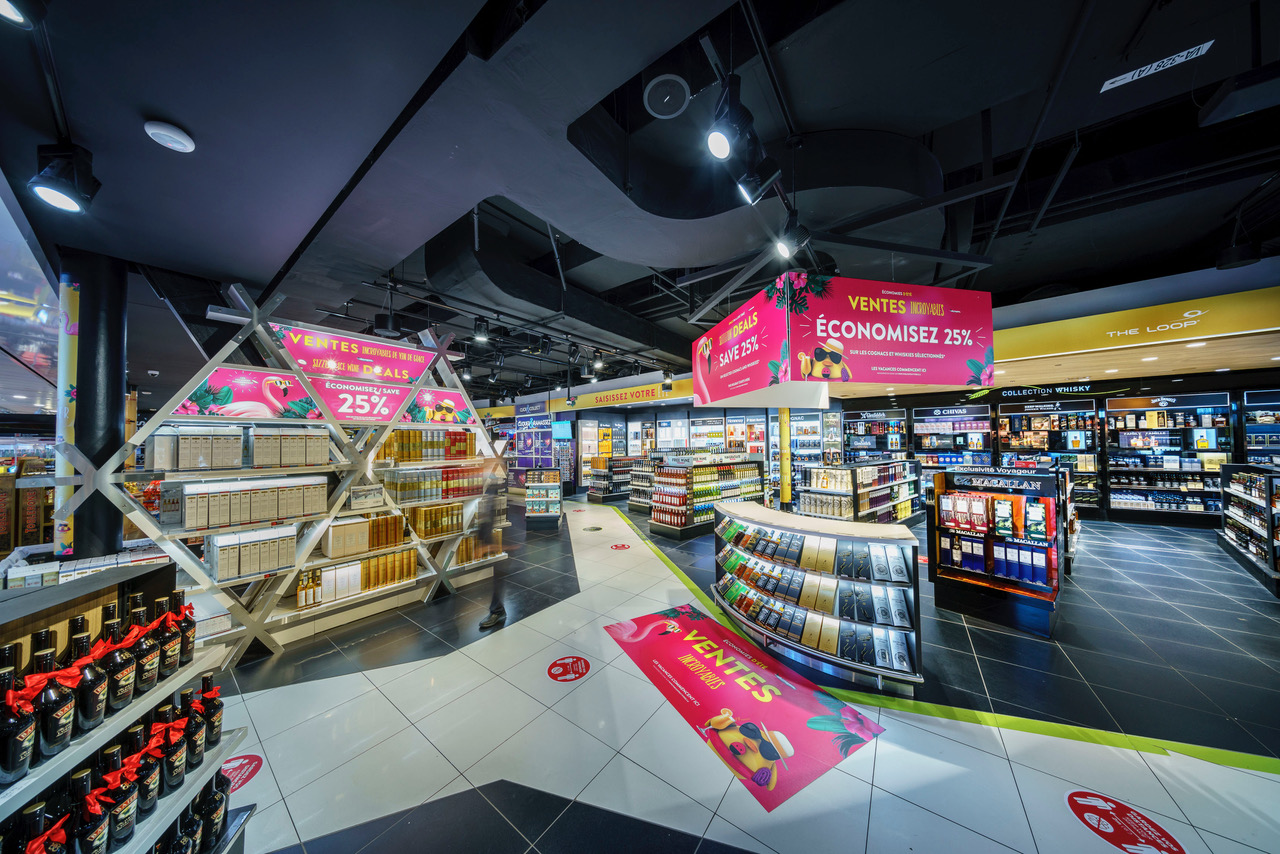
The company has continued to order best-selling stock, but has scaled down on orders

